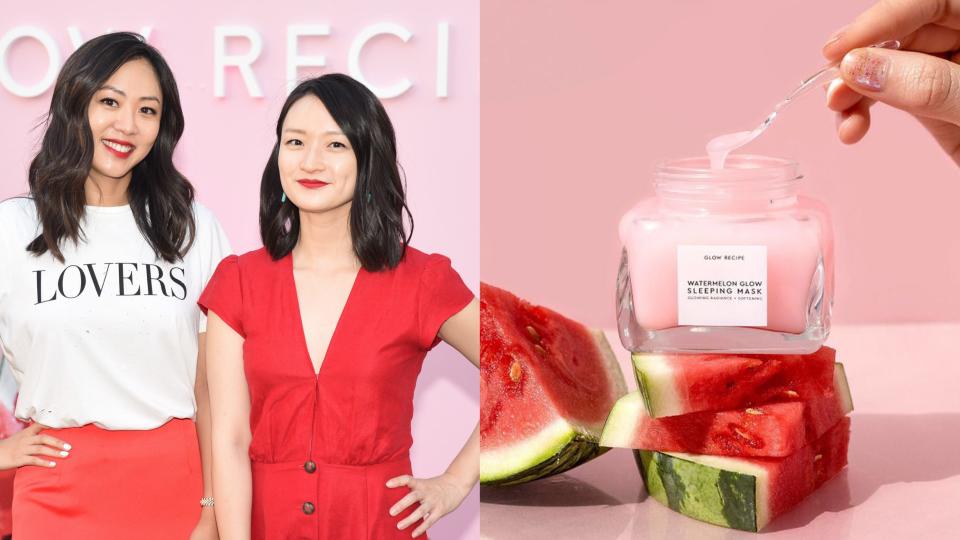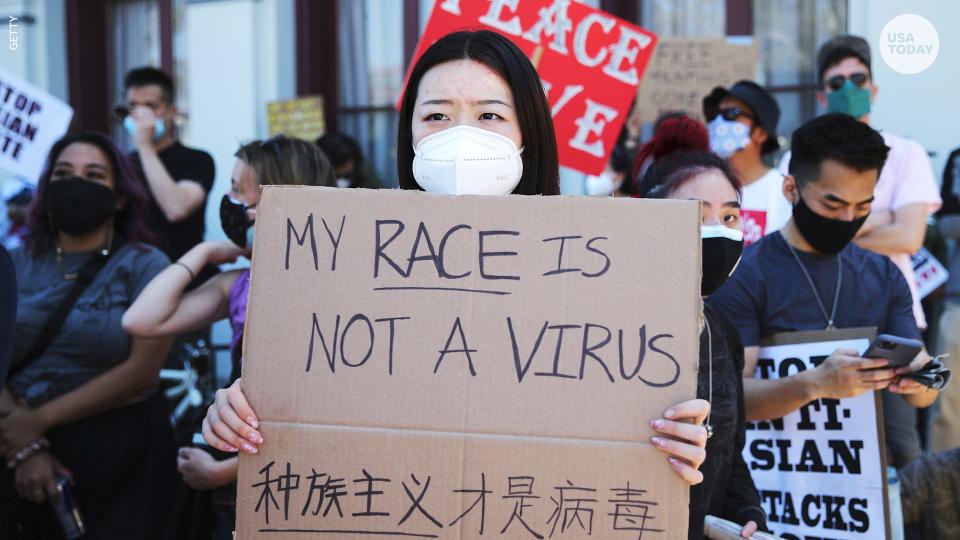This is America: ‘Squid Game,’ K-beauty and BTS - What’s so special about Korean pop culture?
I'm back! It's Jenna Ryu, former Life and Travel intern, now promoted to Life and Wellness fellow.
You may remember me from my last "This is America" takeover, where I tackled the Asian "model minority" myth and shared my experience confronting these microaggressions. (If not, see here.)
But today, I’m here to talk about "Squid Game," the South Korean Netflix series that everyone can’t stop talking about.
I won't lie: I was shocked to witness the global obsession with this show. After a year of racial reckoning during the pandemic, I pessimistically assumed people wouldn't be craving a "foreign" series with minimal English dialogue (unless you watched with dubbing — in that case, we didn't watch the same show. Sorry!).
This isn’t the first time Korean pop culture has made a breakthrough in this country. Psy’s “Gangnam Style” and Korean boy group BTS introduced the world to the allure of K-pop. Bong Joon-ho's "Parasite" conquered Hollywood as the first foreign-language film to win best picture at the Oscars. Even Korean cosmetic products are dominating the shelves of beauty stores like Sephora and Ulta.
There's K-pop, K-movies, K-dramas, K-fashion, K-beauty, and of course, KBBQ! But what led to this wave?

'Squid Game': Why are we obsessed with the South Korean brutal horror series?
'It still feels surreal': BTS makes Grammys history, whether they win on Sunday or not
But first: Race and justice news we're watching
Important stories of the past week, from USA TODAY and other news sources.
What Colin Powell's death and groundbreaking career meant for many Black Americans
'I became what I didn't see': Latinx and Hispanic influencers speak up about representation
A 'lynching' or self-defense? 3 Georgia men go on trial in the 2020 murder of Ahmaud Arbery
'Handmaid’s Tale' author Atwood sparks controversy: The danger of passive transphobia
What happens when conservative school boards gain power at districts around the country
The history behind Korea's rise in America
Seeing non-Asians taking the time to learn my language to sing along with BTS or create our dalgona candy from "Squid Game" wasn't something I would've expected ten years ago.
In only a few years, Korean culture went from niche to mainstream in the USA. How?
Surprisingly or not, Korean culture is appealing to Americans in part because it was heavily influenced by American culture itself (Here's a history fun fact: The U.S. had a strong military presence in South Korea). From Korea’s red ginseng in American skincare products to Korean celebrity fashion influenced by Western designers, what's popular has been intertwined for decades.
Scholars also attribute the inter-culture pick-up to Korea’s geopolitical location.
"Korea has always played the role of a cultural mediator between China and Japan for centuries, and after the Korean War, between the East and the West — with a strong influence of Korean American culture,” said Inkyu Kang, an associate professor of journalism at Penn State Behrend.

The United States is also a fascinating example of how a country can benefit from diverse racial, ethnic and cultural backgrounds. After all, one in seven U.S. residents is an immigrant, according to research from the American Immigration Council.
"Nowadays, it'd be difficult not to have at least a passing acquaintance with an ethnic Korean person or things Korean," says John Lie, a sociology professor at the University of California, Berkeley.
"The growing popularity of South Korean popular culture has normalized Korean culture for many non-Korean Americans, especially in the past decade or so."
Korean movies and shows aren't just entertainment. They're social critiques
There's no doubt that "Parasite" and "Squid Game" were "good." They included stellar acting and enticing plot lines. But what made it resonate so hard with viewers goes beyond these technical accomplishments.
It's the deeper, dark social commentary that makes Korean pop culture stand out, says Kang.
Many of these films and TV shows aren't afraid to tackle complex, social issues that transcend geographic barriers: They address the nightmarish reality of social inequality, the dark truths of youth unemployment and even the taboo topic of Korea's high suicide rate.
Take, for instance, BTS' "Whalien 52," which discusses depression (in a country that fosters mental health stigmas), or "Parasite," which bluntly depicts the divide between the rich and poor.

Opinion: Why 'Parasite's best-picture win was the diversity victory the Oscars desperately needed
For years, Korean entertainment has been doing what others have only scratched the surface of. "Squid Game," "Parasite," and the even lesser-known "Train to Busan" (2016) and "Veteran" (2015) don't hesitate to critique the dark sides of society to create a disturbing story you can't stop thinking about.
This isn't a particularly new phenomenon in Korean culture. According to Kang, this self-expression dates back to the 1970s and 80s, when Koreans used music and art to protest during South Korea's democracy movements.
"Social commentary became part of the DNA of Korean popular culture while Koreans were fighting tyranny decades ago," Kang explains. "Many songs were written to deliver social messages directly or indirectly and were widely sung as protest songs."
So when Korea finally achieved democracy in 1987, these young Koreans, newly introduced to activism and social awareness, used this "newfound freedom in the cultural sector including film, television and music," which we're clearly seeing today.
'Parasite' making history: Why 'Parasite's best-picture win was the diversity victory the Oscars desperately needed
Korean culture is finally seen as cool. So why are we still being attacked?
Growing up in a predominantly white and homogenous neighborhood, I spent my childhood years being bullied for my culture: My food smelled “weird.” My language sounded “funny.” My eyes looked “different.”
Living in this environment that punished me for my differences eventually took a toll on my self-esteem and sense of identity — something that many Asian Americans can relate to. I found myself doing everything I could to blend in. I'd dye my hair lighter, swap out my kimchi fried rice for bland pasta and ultimately abandon my heritage just for a glimmer of acceptance.
On one hand, this Korean cultural wave feels rewarding: My traditions are finally being embraced. But something about this newfound appreciation feels strange. Off. Almost superficial.
That's because I can't help but remember that Korean Americans, and other members of the Asian American community, are being brutally attacked and murdered for simply existing. (There were upwards of 9,000 anti-Asian hate incident reports from March 19, 2020, to June 30, 2021, reported Stop AAPI Hate.)

I'm 'afraid to leave my house': Asian women are living in fear amid rise in hate crimes
"An appreciation for Korean culture can help people become more open to other cultures, but I don’t think it guarantees the reduction or elimination of anti-Asian hatred and discrimination," Kang says.
After years of bullying and insecurity, I'm grateful that my culture is finally making waves in this country. But with that being said, you can’t stan BTS, you can’t rave about "Squid Game," without also standing up for its people.
I hope readers remember that it's important to embrace all people, languages, food and cultures — even if they are different. After all, "we as humans have far more similarities than differences. All human beings are 99.9 percent identical genetically," Kang reminds.
--
This is America is a weekly take on current events from a rotating panel of USA TODAY Network journalists with diverse backgrounds and viewpoints. If you're seeing this newsletter online or someone forwarded it to you, you can subscribe here. If you have feedback for us, we'd love for you to drop it here.
This article originally appeared on USA TODAY: 'Squid Game,' BTS, K-beauty: Why Korean pop culture is making waves

 Yahoo Movies
Yahoo Movies 
